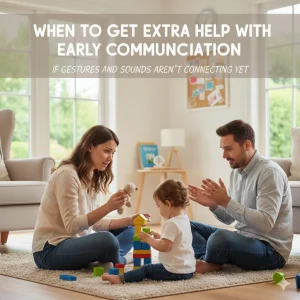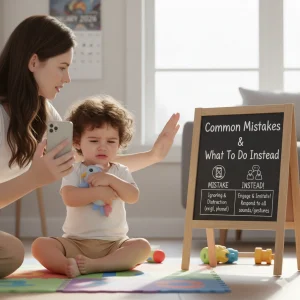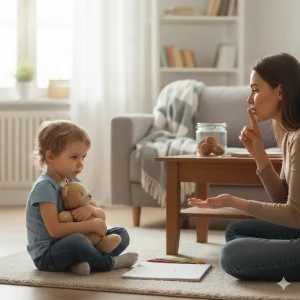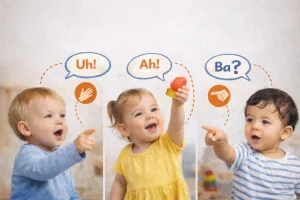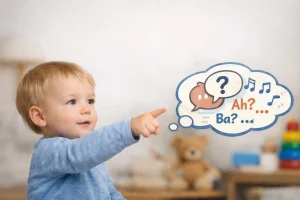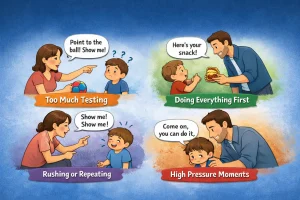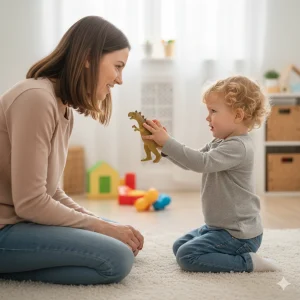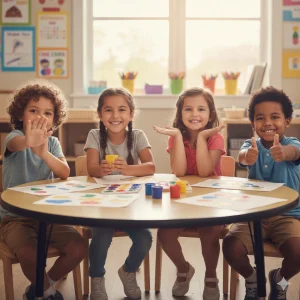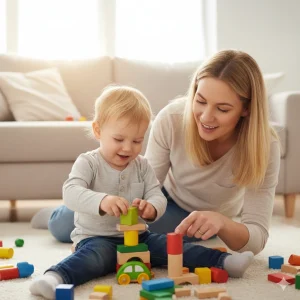How to Spot Speech and Social Red Flags in Toddlers
By Wellness Hub
Last Updated: July 15, 2025
It’s completely normal to wonder if your toddler is developing “on time.” Every child grows at their own pace, and some may start talking or socializing a little later than others. But in some cases, delays in speaking or interacting could be early signs of a deeper concern — what experts call speech and social red flags in toddlers.
Spotting these red flags early can make a big difference. Whether your child isn’t talking much, avoids eye contact, or doesn’t seem interested in playing with others, trust your instincts. Paying attention now can lead to better support later.
What Are Speech and Social Red Flags in Toddlers?
“Red flags” are simply early warning signs that your child may not be meeting typical milestones for their age. These signs don’t always mean something is wrong — but they do signal that a closer look could be helpful.
What is a Social Delay?
A social delay means your toddler isn’t picking up on basic social behaviors, like making eye contact, playing with others, or responding to their name. These skills are part of toddler social development, and delays here might show up earlier than speech issues.
Common Social Development Red Flags:
- Doesn’t respond to their name by 12 months
- Avoids eye contact or smiling at people
- Doesn’t imitate simple actions (like clapping or waving)
- Prefers to play alone all the time
- Doesn’t show interest in other children or adults
If you’ve noticed any of these toddler social development red flags, it’s a good idea to gently monitor their progress and talk to a specialist if needed.
Speech Delay vs. Social Delay: What’s the Difference?
Here’s a quick comparison to help you understand how these two types of delays show up:
| Area | Speech Delay | Social Delay |
|---|---|---|
| Focus | Making sounds, using words | Interaction, play, eye contact |
| Example Sign | Not saying any words by 18 months | Doesn’t look at you when you talk |
| Impact | Difficulty expressing needs | Difficulty connecting or sharing attention |
| May Signal | Speech/language delay, hearing issue | Social delay, possible early sign of autism |
Why Early Signs Matter
Some toddlers outgrow mild delays on their own. But others may need a little extra help — and starting early often leads to better results. Early signs are your signal to pause, observe, and reach out if needed.
Key Speech Red Flags to Watch in Toddlers
Speech development can look a little different for every toddler — but there are some clear signs that can help you know when to check in. If your child isn’t using sounds, words, or short phrases by certain ages, it may point to a speech delay.
Let’s break it down into simple, age-based markers and situations when it’s worth reaching out for support.
Signs of Speech Delay in Toddlers
If your toddler isn’t talking much yet, you’re not alone — many parents search for signs of speech delay in toddlers when their little one isn’t meeting common milestones. Here’s what to watch for:
| Age | Signs of Speech Delay |
|---|---|
| By 12 months | – No babbling like “ba-ba” or “da-da” – Doesn’t make a variety of sounds |
| By 16 months | – Not saying any single words (e.g., “mama,” “ball,” or “bye”) |
| By 2 years | – Not combining two simple words (e.g., “more milk” or “go out”) – Uses only a few words repeatedly with no new words added – Others often comment: “Your toddler is not talking yet?” |
What’s Typical?
Most toddlers say 50+ words by age 2 and start combining them into phrases. If that’s not happening, it could be time for a gentle evaluation.
When to Worry About Toddler Speech
It’s not just about when speech starts — how it progresses matters too. Some children may begin talking and then stop, or their speech may remain unclear well past toddlerhood. These are important speech red flags.
Here are signs it’s time to act:
- Speech seems to stop or go backward (also called regression)
- Speech is still unclear or hard to understand after age 2.5
- Child doesn’t follow simple instructions like “give me the ball” or “sit down”
- Rarely tries to imitate words or sounds
- Might not respond when spoken to — this could also suggest a hearing issue
Social Development Red Flags in Toddlers
Just like speech, social skills grow in stages. Babies and toddlers learn how to connect with others through eye contact, facial expressions, gestures, and play. But when these early social behaviors are missing or delayed, it may be a sign of something deeper — like a toddler social delay.
Let’s look at some common red flags parents can watch for.
Early Signs of Social Delay
Most babies naturally start to engage with the people around them — they smile, make eye contact, and reach out to interact. If these milestones don’t appear, it might be a sign that your toddler is experiencing social interaction difficulties.
Here are some signs to notice:
- Not making eye contact by 6 months
Eye contact is one of the earliest ways babies bond with caregivers. If your child avoids looking at your face during play or feeding, take note. - Doesn’t respond to their name by 12 months
If you’ve called their name multiple times and your toddler still doesn’t turn or look at you, this may be one of the clearer toddler social delay signals. - Shows little interest in people, toys, or play
If your toddler prefers to be alone, doesn’t smile at others, or avoids games like peek-a-boo, it’s worth watching more closely.
These behaviors may not seem big on their own — but taken together, they can point to a need for early support.
Could It Be a Sign of Autism?
Sometimes, social delays overlap with early signs of autism in toddlers. That doesn’t mean every child with a delay has autism — but recognizing patterns early can help you support your child’s unique needs sooner.
Here are signs that may be associated with both autism and social developmental delays:
- Toddler not responding to name consistently
- Avoids eye contact or doesn’t seek out attention
- Doesn’t point, wave, or use gestures to communicate
- Prefers to play with objects over people
- Repeats certain actions or gets very focused on routines
Important to Remember:
Not all social delays mean autism. Every child is different, and some simply need more time or interaction. But if you’re concerned, it’s always a good idea to speak with a specialist.
At Wellness Hub, our child development team offers early autism screenings and gentle guidance to help you understand what your toddler needs next
What Causes Speech and Social Delays in Toddlers?
If your toddler isn’t talking or socializing the way you expected, it’s natural to ask, Why is this happening? Understanding the causes of speech delay and communication delays in toddlers can help you take the next steps with more clarity and confidence.
While every child is different, there are some common factors that may affect speech and social development.
1. Hearing Issues
One of the most overlooked reasons for delayed speech is trouble hearing. If a child can’t hear sounds clearly, they may struggle to learn how to copy or use words.
- Frequent ear infections or fluid in the ears can affect hearing
- Your toddler may seem to ignore you, but it’s because they didn’t hear you
2. Developmental Delays or Autism
Sometimes, speech and social skills are delayed due to broader developmental challenges.
- In some cases, delays may be linked to autism spectrum disorder, especially if paired with signs like limited eye contact, repetitive behaviors, or lack of gestures.
- Other times, children may have global developmental delays that affect more than one area (motor, cognitive, communication).
Early evaluation is key — not just for a diagnosis, but to build a plan that supports your child’s strengths and needs.
3. Lack of Interaction or Stimulation
Children learn to speak and connect by watching, listening, and playing with others. If a toddler doesn’t get enough interaction, they may fall behind in these areas.
- Limited back-and-forth conversation
- Few opportunities to play or explore with adults or other kids
- Passive screen time replacing real-life engagement
Talking, reading, singing, and playing daily can make a big difference in building your child’s communication skills. Even small moments count!
4. Screen Time and Environment
Too much screen time — especially without adult interaction — can lead to delayed speech and reduced social engagement.
- Background TV, videos, or mobile phones may distract from real communication
- Toddlers need active play and real conversations, not just passive listening
The environment matters — toddlers thrive in a space where they feel safe, seen, and heard.
Why Early Bonding and Play Matter
The best way to support your toddler’s development? Talk, play, repeat.
- Make eye contact while speaking
- Respond to their sounds and gestures
- Join them in pretend play and turn-taking games
These small but powerful actions build the foundation for strong communication.
What Are Normal Milestones in Speech and Social Development?
Every toddler grows in their own way, but there are certain milestones most children reach around the same age. These toddler communication milestones help parents gently track their child’s progress in speech, eye contact, play, and social interaction.
Think of milestones as helpful guideposts — not deadlines. If your child hasn’t hit a few of these yet, it doesn’t always mean something is wrong. But knowing what to expect can help you spot areas where extra support might be helpful.
Here’s a simple breakdown to compare and reflect gently.
Speech and Social Milestones by Age
| Age | Speech & Language | Social & Play |
|---|---|---|
| 12 months | – Babbles with different sounds (ba, da, ma) – Says 1–2 words like “mama,” “bye” | – Makes eye contact – Responds to name – Enjoys peek-a-boo or pat-a-cake |
| 18 months | – Says at least 10 words – Understands simple words like “no” or “come” | – Points to show interest – Shows affection – Imitates adults or older children |
| 24 months | – Says 50+ words – Begins combining 2-word phrases (like “want milk”) – Follows simple directions | – Plays beside other children (parallel play) – Copies actions and gestures – Shows more emotions like frustration or joy |
| 36 months | – Speaks in 3–4 word sentences – Asks simple questions – Strangers can understand about 75% of what they say | – Plays with others and takes turns – Shows interest in make-believe – Understands “mine” and “yours” |
What if your toddler is not reaching these speech and social milestones?
- If they’re not saying a few words by 18 months…
- If they avoid eye contact or don’t point by 12 months…
- If their speech is still hard to understand at age 3…
These may be signs it’s time to speak with a professional.
When Should You Seek Help for a Toddler’s Development?
As a parent, it’s natural to wonder “Is this normal?” when your toddler isn’t talking much or doesn’t seem interested in others. The truth is — asking those questions early is a good thing. It shows you’re tuned in.
If your child is missing key speech or social milestones, or if you notice any red flags that don’t seem to improve with time, it might be the right moment to take a closer look. You don’t have to wait for things to “fix themselves.”
It’s Okay to Ask for Help Early
Many parents feel unsure about bringing up concerns — but early support is never a mistake. In fact, getting guidance early can actually make speech and social progress much smoother.
You might want to seek help for speech delay or social delay if:
- Your toddler isn’t meeting important milestones
- You feel something’s “off,” even if others say it’s fine
- Your child’s development is slower than peers or siblings
If you’re still unsure, a friendly screening can give you peace of mind. No pressure — just clarity.
When Red Flags Don’t Go Away
If you’ve noticed early signs like no eye contact, very few words, or little interest in people — and those things haven’t improved over time, it’s a good idea to speak to a professional.
Here are some specific examples of when to reach out:
- Not saying single words by 16–18 months
- Not combining words by age 2
- Avoiding eye contact or not responding to name after 1 year
- Speech or behavior that suddenly stops or regresses
Regression is especially important — if your toddler loses skills they once had, don’t wait. Act sooner and get expert advice.
Support Is Just a Click Away
If you’re wondering whether your child may benefit from therapy, Wellness Hub is here to help.
We offer:
- Speech therapy for toddlers (online and personalized)
- Early developmental screening and autism evaluations
- Simple milestone trackers and parent resources
How Wellness Hub Supports Early Development
At Wellness Hub, we understand how worrying it can be when your toddler isn’t hitting expected milestones. That’s why we focus on early intervention for toddlers, offering families trusted support in the early stages of speech, social, and behavioral development.
Whether your child is just a little behind or showing more noticeable delays, our team is here to help — gently and professionally.
Expert Support for Speech, Autism, and Developmental Delays
Our specialists work with toddlers experiencing:
- Speech delays
- Social and communication challenges
- Early signs of autism
- General developmental delays
We don’t just offer therapy — we provide the tools, tracking, and reassurance parents need to move forward with confidence.
Online Therapy and Parent Tools – Designed for Busy Families
You don’t have to travel far or wait for weeks to get help. Wellness Hub offers:
- Personalized speech therapy for toddlers, fully online
- Age-wise milestone checklists to help you track your child’s progress
- One-on-one sessions with certified therapists who guide you every step of the way
We make it easy for you to access support for speech delay from the comfort of your home — on your schedule.
Conclusion
If you feel your toddler’s speech or social skills are delayed, don’t wait. Trust your instincts. Every child is different, but getting early help for toddlers can make a big difference. You don’t need to panic — just observe gently and take small steps. Many delays improve with the right support. At Wellness Hub, we offer expert speech development support, milestone checklists, and online speech therapy. If you’re unsure, book a free consultation or explore our early signs guide. You’re not alone — we’re here to help your child grow and thrive.
Frequently Asked Questions:
1. What are speech red flags in toddlers?
Speech red flags are signs that your toddler may not be developing language as expected. These can include:
- Not babbling by 12 months
- Not saying any words by 16 months
- Not combining two words like “more juice” by age 2
- Having trouble being understood after age 2.5
If your toddler is not talking yet or not using words like other kids their age, it might be time to speak with a speech therapist.
2. What are social red flags in toddlers?
Social red flags are signs that a toddler may have trouble connecting with others. Some examples are:
- No eye contact by 6 months
- Doesn’t respond to their name by 12 months
- Doesn’t show interest in people or toys
- Prefers to play alone all the time
These signs may suggest a toddler social delay or even early signs of autism. It’s best to observe and ask for help if these continue.
3. When should I worry if my toddler isn’t talking?
It’s okay to worry — many parents do. If your child:
- Hasn’t said their first word by 16–18 months
- Isn’t combining words by age 2
- Has lost speech they once had (regression)
…then it’s a good time to get early help for toddlers. The sooner you get support, the easier it is to help your child catch up.
4. Why is my toddler not responding to their name?
Not responding to their name by 12 months could mean:
- Hearing issues
- Lack of attention or interest
- Social development delay
- Possible early signs of autism
Try calling their name when there are no distractions. If they still don’t respond often, it’s worth talking to a child development expert.
5. How do I know if my toddler has a speech delay?
Look for speech development milestones like:
- Babbling (6–9 months)
- First words (12–16 months)
- Combining words (by 2 years)
6. Can too much screen time cause speech delays?
Yes. Too much screen time — especially without adult interaction — can reduce your toddler’s chance to learn real-world language skills. Talking, singing, and playing are better ways to build communication.
Even short daily conversations help more than hours of watching cartoons.
7. Are speech and social delays always a sign of autism?
Not always. Some toddlers just take longer to develop speech or social skills. However, when delays happen together or with other signs (like not pointing, avoiding eye contact, or repeating actions), they could be early signs of autism.
8. What causes speech and social delays in toddlers?
Common causes of speech delay and social delay include:
- Hearing problems
- Autism spectrum disorder
- Developmental delays
- Lack of play or interaction
- Too much screen time
- Premature birth or medical conditions
Each child is different. A simple screening with a therapist can help find the reason.
9. What are normal speech and social milestones by age 2?
By 2 years old, most toddlers can:
- Say at least 50 words
- Combine two words like “want toy”
- Follow simple directions
- Point to show what they want
- Show interest in others and play beside them
10. Where can I get help if I’m worried about my toddler’s development?
Start by talking to your pediatrician. You can also reach out to Wellness Hub, where we offer:
- Free developmental screenings
- Online speech therapy for toddlers
- Tools to track milestones
- Parent-friendly guidance from experts
About the Author:
Anuradha Karanam
Speech-language pathologist (7+ years of experience)
Anuradha Karanam is a skilled speech-language pathologist with over 6 years of experience. Fluent in Tamil, Telugu, Hindi, and English, she specializes in parent counseling, speech sound disorders, fluency assessment, and speech-language evaluations. Anuradha excels at working with children with developmental disorders, offering creative and effective therapy programs. Currently, at Wellness Hub, she holds a BASLP degree and is registered with the RCI (CRR No A85500). Her patience, ambition, and dedication make her a trusted expert in her field.
Book your Free Consultation Today
Parent/Caregiver Info:
Client’s Details:
* Error Message
